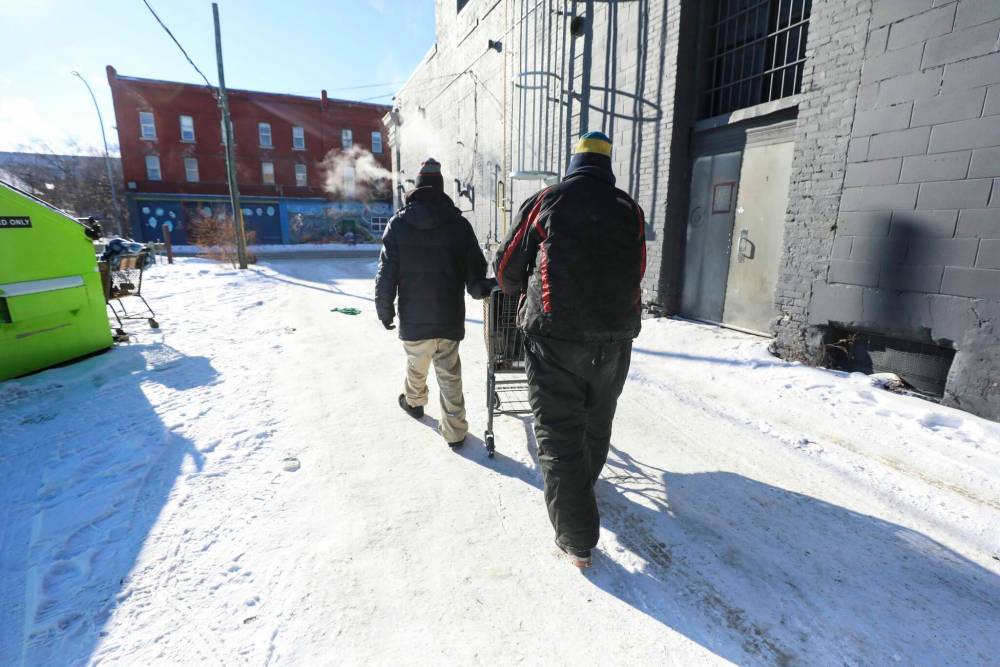Misguided response to street census data
Advertisement
Read this article for free:
or
Already have an account? Log in here »
To continue reading, please subscribe:
Monthly Digital Subscription
$0 for the first 4 weeks*
- Enjoy unlimited reading on winnipegfreepress.com
- Read the E-Edition, our digital replica newspaper
- Access News Break, our award-winning app
- Play interactive puzzles
*No charge for 4 weeks then price increases to the regular rate of $19.00 plus GST every four weeks. Offer available to new and qualified returning subscribers only. Cancel any time.
Monthly Digital Subscription
$4.75/week*
- Enjoy unlimited reading on winnipegfreepress.com
- Read the E-Edition, our digital replica newspaper
- Access News Break, our award-winning app
- Play interactive puzzles
*Billed as $19 plus GST every four weeks. Cancel any time.
To continue reading, please subscribe:
Add Free Press access to your Brandon Sun subscription for only an additional
$1 for the first 4 weeks*
*Your next subscription payment will increase by $1.00 and you will be charged $16.99 plus GST for four weeks. After four weeks, your payment will increase to $23.99 plus GST every four weeks.
Read unlimited articles for free today:
or
Already have an account? Log in here »
Hey there, time traveller!
This article was published 21/11/2022 (1107 days ago), so information in it may no longer be current.
A week after the release of the Winnipeg Street Census 2022, which reached more than 1,200 unhoused Winnipeggers, Manitoba’s Progressive Conservative government committed to addressing the issue of homelessness by allocating more funds — not to housing or social services, but to police operations.
Homelessness is not an issue of criminality. It is an issue of poverty, and in part the byproduct of apathy among policy-makers for the most vulnerable members of society.
And yet, last Tuesday’s throne speech, delivered by Lt.-Gov. Anita Neville, touted tackling “the underlying issues of homelessness, addictions and mental health by providing increased supports for front-line law enforcement officers” and increased police presence. This is a flawed, and potentially perilous, path forward.

RUTH BONNEVILLE / WINNIPEG FREE PRESS FILES
Winter is particularly challenging for those experiencing homelessness.
In Winnipeg and across the country, police officers have repeatedly — and, on occasion, fatally — proven ill-suited to dealing with vulnerable citizens. The 2019 killing of Machuar Mawien Madut by Winnipeg police officers during a mental-health crisis and the shooting deaths of Chantal Moore and Rodney Levi by New Brunswick police during wellness and mental-health calls are tragic examples of interactions gone wrong.
Along with a lack of money for housing, mental-health and addiction issues were among the dominant causes of homelessness cited by residents polled for this year’s Winnipeg Street Census. Unless officers are properly trained and working in conjunction with mental-health professionals, increased policing risks putting this population in harm’s way.
The street survey counted 1,200 children, youth, adults and seniors living in Winnipeg without proper shelter, and acknowledged the actual homeless population is likely closer to 4,000 people.
Instead of actually addressing the root causes of homelessness — most notably poverty, as indicated by the survey — the province has instead framed this systemic issue as a personal choice, with the assertion that increased police funding will “provide the tools and staffing necessary to deal with those who have resisted help, preyed on others and chosen a life outside the law.”
In its throne speech, the Stefanson government also pointed to recent investments in the local shelter system. While more funding for on-the-ground organizations is sorely needed, shelters aren’t a long-term solution and there are many people who avoid those settings for safety reasons. Sobriety is also a prerequisite at many places, a condition that prompts some to stay away.
Finland has thus far found success addressing chronic homelessness by implementing a “housing first” strategy — a philosophy that approaches housing as a basic human right and sees permanent shelter as the first step to solving homelessness, not the end result. Once a person is housed, they are better equipped to seek support for issues such as addiction and mental health.
To do this, the Finnish government finances affordable social housing, requires 25 per cent of new developments to be reserved for low-income families and provides wraparound supports for residents. Since the 1980s, the strategy has seen the number of people experiencing long-term homelessness drop from 20,000 to less than 4,000 — in a country of more than five million people.
One of the reasons this publicly funded program has seen support from politicians and citizens alike is that it costs significantly more to keep people homeless — through policing, emergency health care and the justice system — than it does to find people a permanent place to live.
Adding more police to Winnipeg streets does nothing to help get people housed. If the provincial government is genuinely concerned about its most vulnerable citizens, it will show more interest in funding proactive solutions than funding reactionary enforcement.




